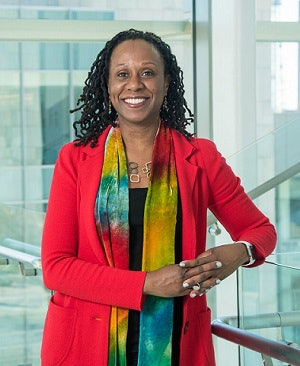Camille Nelson, a second-year law student at the University of Ottawa, is at home when her phone rings.
It’s the vice dean, Sanda Rogers, who wants to know why Nelson has not applied for a clerkship at the Supreme Court of Canada. After all, Rogers says, that’s what the top-performing students do.
 Camille Nelson
Camille NelsonNelson doesn’t know what a clerkship is, but she thinks it would be more beneficial to get experience in her field rather than doing what sounds like secretarial work. After Rogers explains the importance of the opportunity, Nelson decides to apply. And she ends up securing a clerkship with Supreme Court Justice Frank Iacobucci.
“He hired me and changed my life,” says Nelson. “The experience was massively transformative. He opened up to me a world of possibilities.”
That’s what Nelson has endeavored to do for others throughout an academic career marked by pioneering professional success. She not only was the first Black woman to clerk for Canada’s Supreme Court, she went on to become the first woman and first person of color to be appointed dean of Suffolk University Law School and the first Black person in her current position – dean and professor at the American University Washington College of Law.
“In working with Dean Nelson over the years, she has always shown an amazing level of commitment, intelligence and thoughtfulness towards the obligations of law schools and higher education in serving their students,” says Janet Jackson, director of the American Bar Association’s Center for Innovation, on whose governing board Nelson serves as chair of the Fellows Committee. “She brings energy to education, and an urgency when it comes to issues regarding diversity and opportunity for marginalized students.”
For Nelson, being a door-opener and not just a role model is an important way of paying forward how numerous people – such as Rogers and Iacobucci – helped and encouraged her.
“I have managed to have access,” she says. “What that means for me, as a leader, is that I am someone who cares deeply about the pipeline, the pipeline to education, the pipeline to career opportunities and leadership.”
The pipeline of Nelson’s life began when her teacher father and secretary mother moved from Kingston, Jamaica to Canada near Toronto in search of greater opportunity. Nelson, the eldest of three girls, says she was always a serious student who earned good grades. Her parents wouldn’t have it any other way.
Nelson received a bachelor’s degree with honors in administration from the University of Toronto, a law degree from the University of Ottawa and then a master’s of law from Columbia Law School in New York. Her career track began as a law professor at Saint Louis University, followed by a stint as a dean’s scholar in residence and visiting professor of law at the Washington University School of Law in St. Louis, then on to a law professorship at Hofstra University. She was appointed dean and professor at Suffolk University’s School of Law in Boston – where the Black Law Students’ Association honored her with its Trailblazer award and the law school named its annual diversity award after her in honor of her work – and in 2016 assumed the same roles at AUWCL in D.C.
Nelson, whose scholarship focuses on critical race theory, has done research, written and spoken widely on comparative and criminal law and the intersection of race, gender, class, national origin and sexual identity. Her work has appeared in academic journals such as Journal of Politics and Law, Berkeley Journal of Criminal Law and Yale Journal of Law & Feminism. Her extensive list of accolades includes being named one of the “Top Women of Law” by Lawyers Weekly in 2013, receiving the Ida B. Wells Award in 2011 from Massachusetts Black Women Lawyers, receiving a Faculty Excellence Award at Washington University and accepting the 2017 Distinguished Alumna Award at the Paul Robeson Conference and Gala presented annually by the Black Law Students Association of Columbia Law School.
Her longtime involvement with professional organizations is extensive. Among her current roles, she is a member of the Overseers’ Committee to Visit the Harvard Law School and an executive committee member of the Association of American Law Schools. She also serves on the Advisory Board for Mina’s List – an organization that “seeks to realize women’s equal and substantive representation in national governments around the world” – and with the ABA’s Center for Innovation since 2016.
“People in my position should encourage people and make a path for them for whatever their goals are,” she says. “That breeds a certain type of empathy, resilience and compassion. Diversity in leadership in every space is a justice issue deep in my heart, and it sort of permeates the way I try to exist in this world and in this space as a dean.”
Jackson at the ABA called Nelson “a wonderful collaborator,” adding that she “is sincere in her compassion, never loses her temper and always makes time for others.”
“She is a creative and energetic voice for ensuring that as we look to innovate within the legal profession, that we include legal education within the discussion. Her involvement and her leadership, especially on issues such as diversity, have been tremendously helpful in ensuring we have inclusive programming as a priority.”
This article appeared in the July 12, 2018 issue of Diverse. It is one in a series of stories about law school deans.















